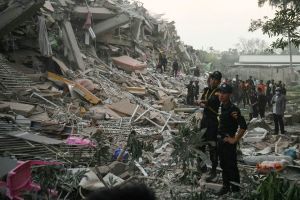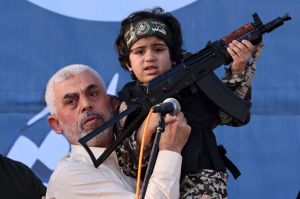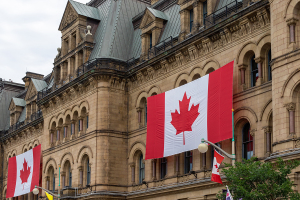A Growing Trend: Brave Muslim Zionists
Mosab Hassan Yousef is a Palestinian Arab Zionist who worked undercover for the Shin Bet, from 1997 to 2007, but that was not his original plan.
"I wanted to infiltrate the Israeli Shin Bet in order to play a double agent and it ended up absolutely the opposite" after seeing Israel's values and humanity, he said in a 2013 Fox News interview. "So I worked for them against Hamas movement ... against evil ... I did what was right to save a human life — Palestinians and Israelis."
Yousef's information is credited with preventing dozens of suicide attacks and assassinations of Israelis, and with exposing numerous Hamas cells. It also helped Israel to hunt down many terrorists, including Yousef's own father, Hamas leader Sheikh Hassan Yousef.
Yousef's story eventually became the subject of a best-selling book, The Son of Hamas, and a documentary film, "The Green Prince." Yousef, who discovered Christianity in 1999 and converted (from Islam) by 2005, has said that groups like Hamas, Hizballah, Boko Haram, ISIS are "all killing in the name of Allah."
"Israel is light, Israel is philosophy, Israel is values and ethics," he said during a 2015 speech before AIPAC. "And I cannot imagine the world without Israel."
The failure of the "Arab Spring" may help to explain the growing trend of Muslims and Arabs supporting Israel. As the hope of democratic reform faded and states crumbled into violent chaos and/or merciless crackdowns on protests, some willing to look past anti-Israel propaganda might admire the only example of a Middle East democracy that tolerates dissent, has a burgeoning economy, upholds the rule of law and human rights, and protects minorities.
For example, after Mohammad Hosseini escaped the horrors of the Islamic State (ISIS) in Iraq, he began to question many of the anti-Israel beliefs on which he was raised.
"I wanted to check the essence of the conspiracy theories, which are common in the Muslim and Arab world against Israel and the Jews," he wrote. "People told me that America and the Jews are responsible for all the problems but on the contrary I saw imams and many religious people joining ISIS willingly and out of admiration."
His research changed his mind about Israel and its conflict with the Palestinians.
"As long as people are committed to the destruction of Israel the Israelies (sic) have an obligation to defend themselves first," Hosseini added. "I want the Israelies (sic) to know that Israel has supporters amongst us. I hope that the Palestinian party would realize that it is unreasonable to kill and then come with demands against Israel, negotiations should be commenced with pure intentions."
Moreover, the singularly brutal approach of ISIS towards religious minorities, or even Sunni Muslims who dare to disagree with ISIS, does much — by way of extreme contrast — to highlight Israeli society's tolerance. Religious minorities in Israel like the Druze, have clearly taken notice, and prefer life under Israeli rule.
Gabriel Nadaf is a leader of the Aramaean Christian minority in Israel and a Greek Orthodox priest who encourages Israeli Christians to enlist in the IDF. In September 2014, he told the United Nations Human Rights Council that "Israel is the only place where Christians in the Middle East are safe." In February 2014, Monaliza Abdo, a young Arab Christian woman who voluntarily enlisted in the Israeli army, spoke publicly about her patriotism and determination to protect all Israelis.
But even members of the majority religion in the Middle East, Sunni Islam, serve in the IDF. There about 1,700 Bedouin Arabs who serve in the Israeli army.
And, perhaps as part of the broader trend of Arabs embracing their Israeli identity, Lucy Aharish, the first Muslim Arab presenter for one of Israel's top TV news channels, proudly defines herself as an Israeli: "Today, when people ask me 'What are you?' I say that I'm an Israeli. I'm not ashamed of my Israeliness. Then I'm a woman, and then I'm an Arab Muslim. That's the order: Israeli, woman, Arab Muslim."
A growing demographic of Zionist Muslims may eventually serve as the bridge to peace between Israel and the wider Islamic world. But as long as Islamist movements persist, such courageous individuals will likely face serious threats.





























